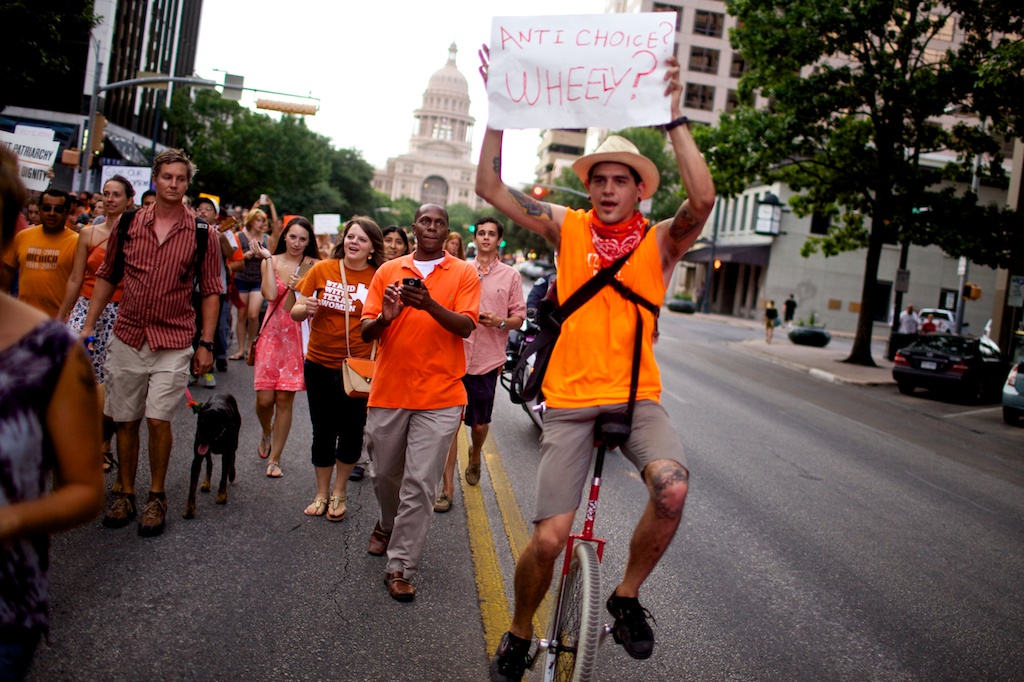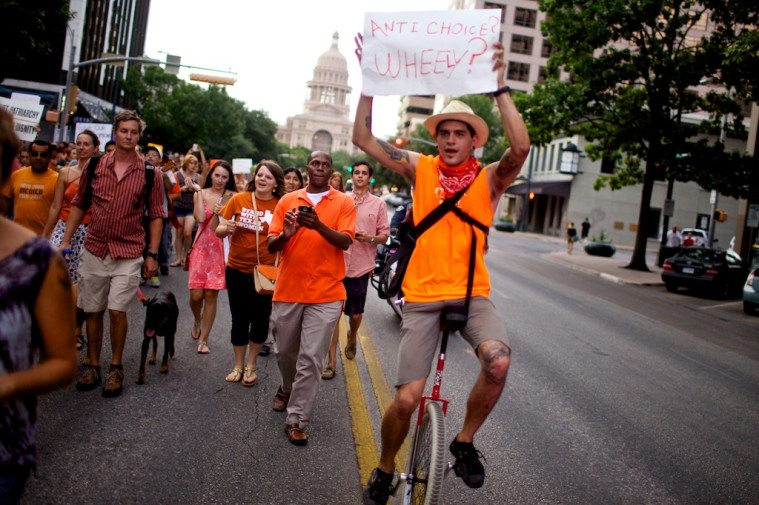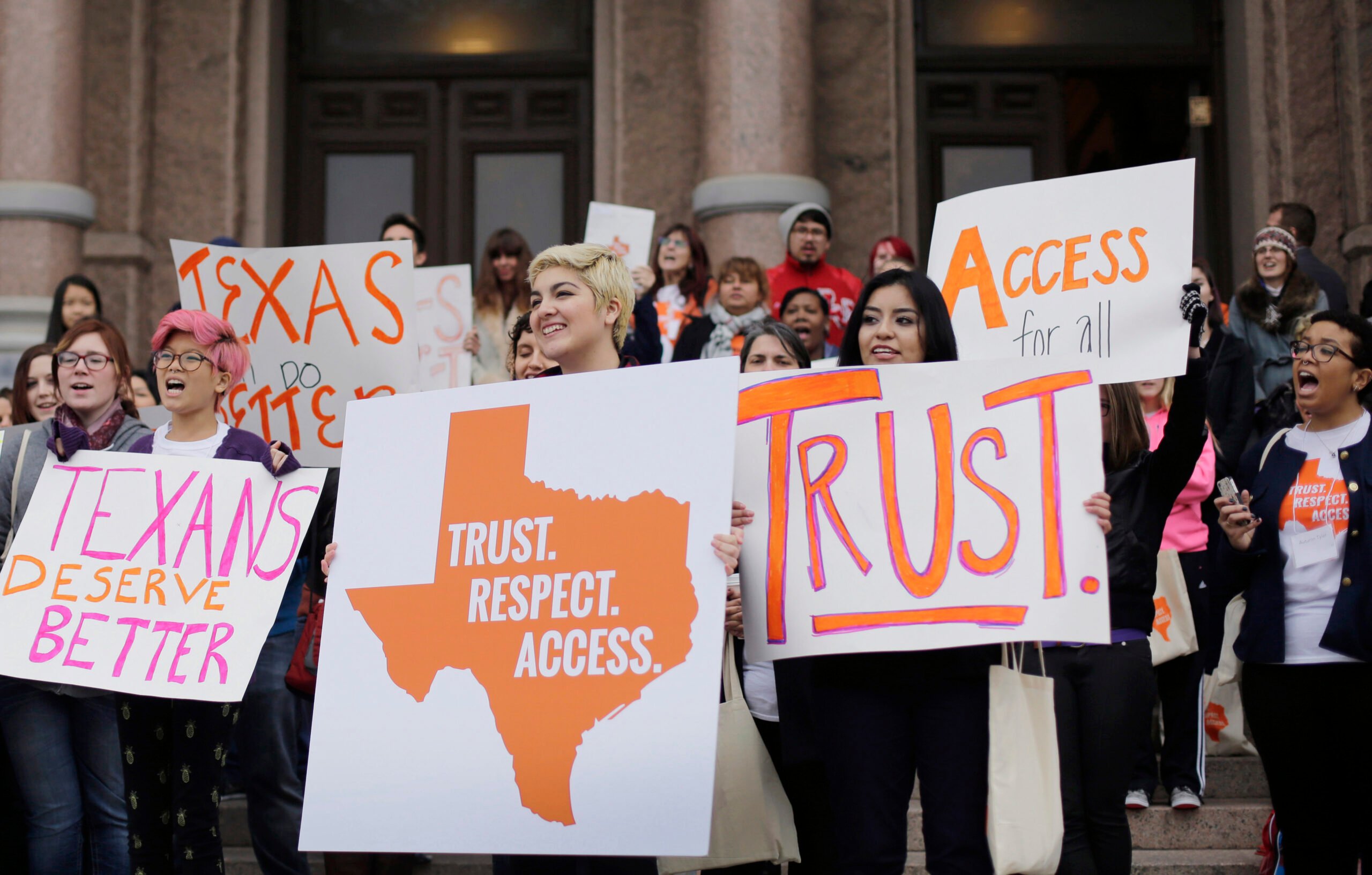
Texans Wait Longer for Abortions as Clinics Close

Above: Pro-choice protesters march down Congress Avenue during the summer of 2013, when anti-abortion lawmakers passed Texas' highly restrictive omnibus abortion law.

New research released Monday shows that Texans who seek abortions are waiting longer to get services as clinics across the state have shuttered in the wake of Texas’ omnibus abortion law. Just 18 legal abortion providers are currently open to serve patients — down from 41 statewide before House Bill 2 passed in 2013.
That’s according to researchers at the University of Texas at Austin’s Texas Policy Evaluation Project (TxPEP), who found that patients in the Dallas area have waited up to 20 days for an appointment after a large abortion provider closed in June of this year. Prior to that, when three abortion clinics were open in the area, patients waited an average of five days. According to the report, one clinic in Dallas was unable to schedule any appointments for new patients in the month of July.
In Fort Worth, where two clinics are currently open, wait times have increased every month, from seven days in June 2015 to up to 23 days in September. In Austin, where two clinics are currently open, wait times at one facility lasted up to 23 days. Wait times in San Antonio and Houston have remained stable at five days, according to the report.
As wait times increase and Texans are forced to obtain abortion services later in their pregnancies, researchers also expect the number of procedures performed during the second trimester to go up. In 2013, prior to HB 2, 6,647 abortions in Texas were performed at 12 weeks of gestation or later. If more Texans are forced to wait 20 days for their first appointments at Texas’ remaining clinics, TxPEP researchers said that number could increase to 12,366.
“The increase in second-trimester abortion is concerning from a public health perspective, since later abortions, although very safe, are associated with a higher risk of complications compared to early abortions,” said Dan Grossman, lead researcher at Ibis Reproductive Health and TxPEP, in a press release announcing the new study. “Later abortion procedures are also significantly more costly to women.”
More than half of Texas’ abortion facilities have closed since October 2013, because many clinics have not been able to comply with two of HB 2’s new restrictions on providers: Physicians who perform abortions must obtain admitting privileges at local hospitals, and licensed abortion clinics must meet expensive, onerous ambulatory surgical center (ASC) standards. Anti-abortion lawmakers said during debate over HB 2 that the new restrictions would make legal abortion safer, but mainstream medical organizations opposed the law, saying it would “harm women’s health in very clear ways.”
Texas abortion providers are challenging HB 2 in court, arguing that in forcing clinics to close and forcing patients to travel and pay for additional costs like travel and childcare, the law creates an undue burden for Texans seeking abortion.
More than half of Texas’ abortion facilities have closed since October 2013, because many clinics have not been able to comply with two of HB 2’s new restrictions on providers.
Right now, thanks to an emergency intervention from the Supreme Court of the United States, 18 abortion clinics are open in Texas, and the surgical center requirement has not taken effect statewide. The Supreme Court, which begins a new term Monday, is expected to decide this month whether to consider the constitutionality of HB 2. Should the high court decide not to take up the case and the surgical center requirements kick in as a result, all of Texas’ abortion providers, except the nine facilities currently operating as ambulatory surgical centers, will be forced to close.
According to the report, patient wait times at those existing nine surgical centers have also increased, suggesting that the hospital-like providers might not be able to meet patient demand if they are the only remaining clinics in the state.
“If the non-ASC clinics close, it seems unlikely that the remaining ASCs — especially the ones that already have long wait times — could increase their capacity to meet the demand for services across the state,” Grossman said.


